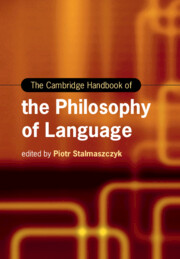Book contents
- The Cambridge Handbook of the Philosophy of Language
- Cambridge Handbooks in Language and Linguistics
- The Cambridge Handbook of the Philosophy of Language
- Copyright page
- Contents
- Figures
- Tables
- Contributors
- Preface
- 1 Philosophy of Language: Definitions, Disciplines, and Approaches
- Part I The Past, Present, and Future of Philosophy of Language
- Part II Some Foundational Issues
- 5 Philosophy of Language, Ontology, and Logic
- 6 Frege’s Legacy in the Philosophy of Language and Mind
- 7 Metasemantics and Metapragmatics: Philosophical Foundations of Meaning
- 8 Internalist Perspectives on Language
- 9 Semantic Content and Utterance Context: A Spectrum of Approaches
- 10 Semantic Minimalism and Contextualism in Light of the Logicality of Language
- Part III From Truth to Vagueness
- Part IV Issues in Semantics and Pragmatics
- Part V Philosophical Implications and Linguistic Theories
- Part VI Some Extensions
- References
- Index
5 - Philosophy of Language, Ontology, and Logic
from Part II - Some Foundational Issues
Published online by Cambridge University Press: 12 November 2021
- The Cambridge Handbook of the Philosophy of Language
- Cambridge Handbooks in Language and Linguistics
- The Cambridge Handbook of the Philosophy of Language
- Copyright page
- Contents
- Figures
- Tables
- Contributors
- Preface
- 1 Philosophy of Language: Definitions, Disciplines, and Approaches
- Part I The Past, Present, and Future of Philosophy of Language
- Part II Some Foundational Issues
- 5 Philosophy of Language, Ontology, and Logic
- 6 Frege’s Legacy in the Philosophy of Language and Mind
- 7 Metasemantics and Metapragmatics: Philosophical Foundations of Meaning
- 8 Internalist Perspectives on Language
- 9 Semantic Content and Utterance Context: A Spectrum of Approaches
- 10 Semantic Minimalism and Contextualism in Light of the Logicality of Language
- Part III From Truth to Vagueness
- Part IV Issues in Semantics and Pragmatics
- Part V Philosophical Implications and Linguistic Theories
- Part VI Some Extensions
- References
- Index
Summary
This chapter considers the various philosophical and methodological questions that arise in the formal analysis of the semantics of language. Formal semantics aims to provide a systematic account of the meaning of language in a rigorous formal framework. It is typically a rule-based analysis of the relevant data and intuitions. This is a broad and complex problem, given the nuances in the use and meaning of everyday language. In practice, this means that a given analysis will confine itself to some specific aspect of meaning, an appropriate sample of the language, and some constrained context of use.
- Type
- Chapter
- Information
- The Cambridge Handbook of the Philosophy of Language , pp. 107 - 123Publisher: Cambridge University PressPrint publication year: 2021

